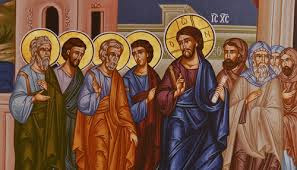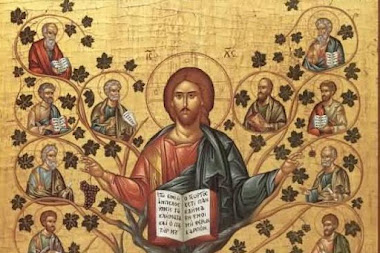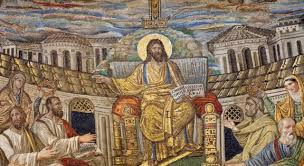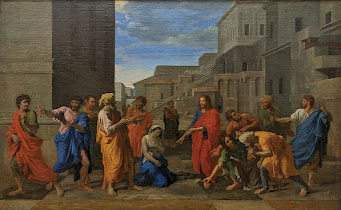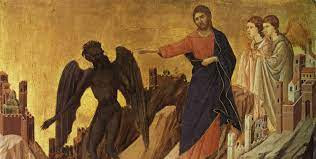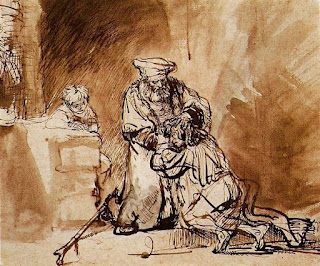What follows are some brief thoughts on the subject of justification. Specifically, with regard to justification and works in the context of dialogue between Catholics and Protestants. One of Jesus’ teachings in the Farewell Discourse speaks against the idea of faith alone being the basis for justification.
In John 14:15 Jesus says “If you love me, you will keep my commandments...” The words of Jesus present us with a conditional, where the standard rules of logic, such as modest ponens/modest tollens, would apply. This will come back into the picture shortly.
Loving the Lord Jesus is an essential component of Christianity. It would be very difficult to see how one could be right with God, that is, justified in any way, without loving Jesus. To think so would militate against what Jesus says a few verses after the one quoted above. “Whoever has my commandments and keeps them, he it is who loves me. And he who loves me will be loved by my Father, and I will love him and manifest myself to him.” (John 14:21) And “If anyone loves me, he will keep my word, and my Father will love him, and we will come to him and make our home with him. Whoever does not love me does not keep my words. And the word that you hear is not mine but the Father’s who sent me.” (John 14:23-24) How can God make an abode with the impenitent or with one who is unjustified? It seems very unlikely to be so. Without justification, sin will preclude divine indwelling.
Add to this very similar verses from 1 John. “And by this, we know that we have come to know him, if we keep his commandments. Whoever says “I know him” but does not keep his commandments is a liar, and the truth is not in him, but whoever keeps his word, in him truly the love of God is perfected. By this we may know that we are in him: whoever says he abides in him ought to walk in the same way in which he walked.” (1 John 2:3-6). Dispelling any doubt, the ‘knowing’ here implies a sense of personal connection, as would be the case when one knows the Lord Jesus in a salvifically relational way.
From the preceding verses, it seems reasonable to conclude that one cannot be justified, that is, in any position of being right with God, without loving Jesus. Loving the Lord Jesus is synonymous with being right with God. Thus, we can rephrase the first conditional (above):
If you are right with God, you will keep the commandments of Jesus.
Jesus commanded us to love God and our neighbor as the Greatest Commandment (Matthew 22:37). To love is to will the good of the other, as other. To love God is to love the things God loves, to will union with Him. To love our neighbor is to will their good. The will is what moves the self toward action. Love is not a feeling, it is action. All Christians will agree with this, as it gets to the heart of the agape given to us in Jesus. We cannot love and do nothing. So, we can rephrase the conditional from John 14:15 again:
If you are right with God, you will do loving things for God and others.
Now, by modest tollens, we can render the verse:
If you do not do loving things for God and others, you are not right with God.
It seems clear that our being right with God is dependent upon our actions. This does not negate grace, for that would mean God was speaking in a contradictory way to us in Sacred Scripture. No Christians holding a high view of Scripture would agree this is the case. Faith and works are mutually reinforcing, as St. James tells us (James 2). I think we can say that, normatively, works are necessarily conjoined with saving faith.
Saving faith and justification are synonymous. Saving faith is an ongoing disposition or habit. Obeying the commandments of Jesus would likewise be part of this continual habit. Obeying the commandments of Jesus includes doing things for other people. This would involve helping them when they are in need, almsgiving, and so forth. What Catholics refer to as spiritual and corporal works of mercy.
Being right with God is therefore conditional upon what we do for others. One cannot claim to be right with God, to be in a loving relationship with Him, and do nothing for one’s neighbor. Works in this sense are part and parcel of our standing with God because they evince our true disposition. Saving faith can therefore never be alone in a normative sense. Our standing with God cannot be severed from our habits and actions toward others.
Further, it makes little sense to say that works merely follow faith, where faith can be alone at any time. This is an artificial construct or abstraction, possible only by rearranging words and cutting away what can never be severed in reality. I can conceive a headless man because I know the concepts of head, man, and so forth. But there can never in reality be a headless man. There could only be what were a human head and a human body. Situating faith as only following and not normatively concurrent with works is like a headless man, not possible in reality.
The move of claiming faith alone would render vacuous what Jesus said in John 14. If I am right with God, then in the present tense I am in a penitential state of grace, wherein no hatred or malice infects my heart. If I am loving the Lord, it includes a present tense disposition and action toward others. This does not nullify the primary originating move of grace, nor do I mean to say that anything we do merits divine grace. Rather, grace moves toward us. We respond. Grace continues to move in us, and we continue to respond. Our continued response to divine grace represents our faith, which in turn, implies our being right with God. This state is necessarily conjoined to a love for God and creation.
In this context, the principle of grace building upon and elevating nature, versus grace doing violence to nature is evident. Much has been said on this subject, and it is perhaps an underappreciated discussion point between Catholics and Protestants on matters of justification and works.
Leaving this larger discussion aside for the time being, it seems to me that John 14, buttressed by 1 John, helps us see that justification cannot be by faith alone. Holding such a position would contravene what Jesus says to us in the form of the conditional of loving Him and keeping His commandments.
